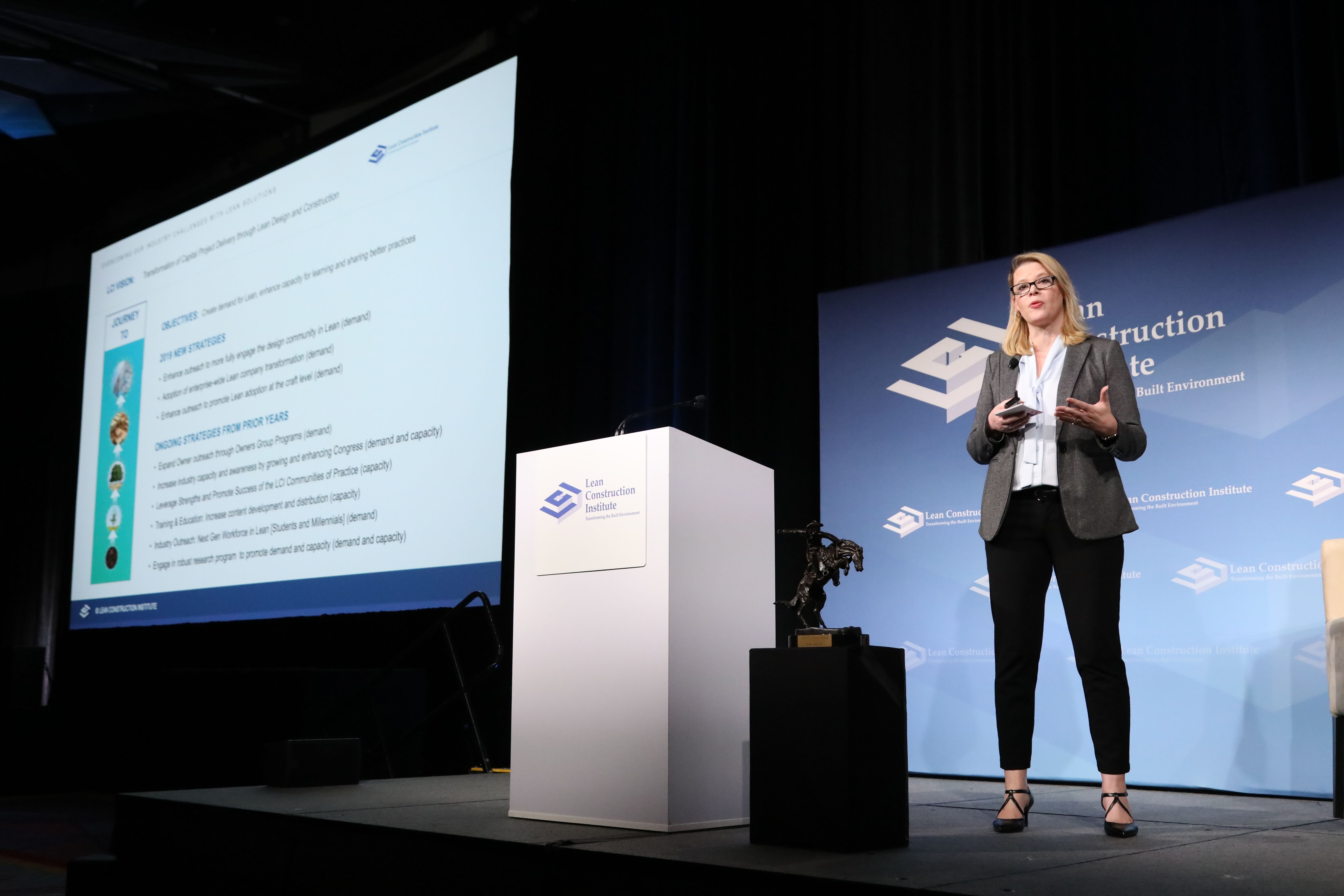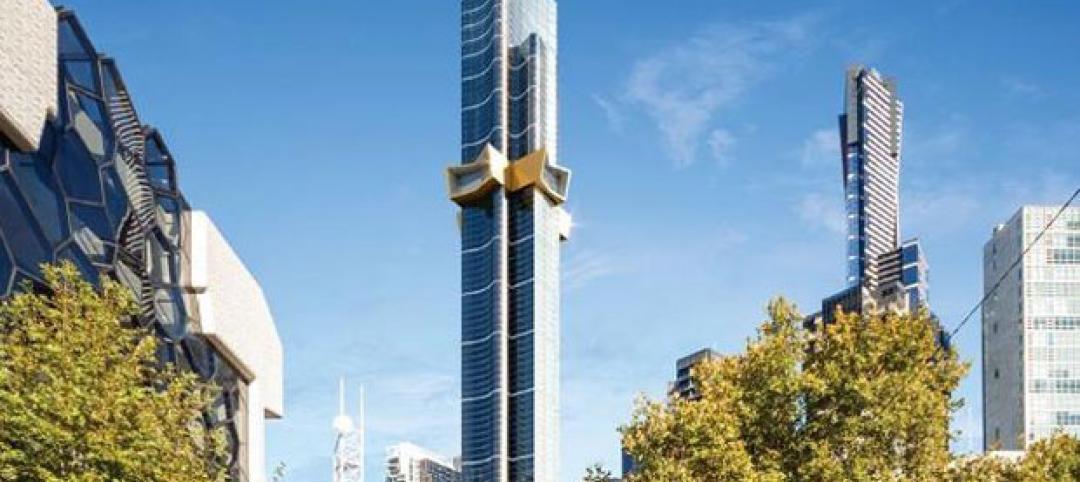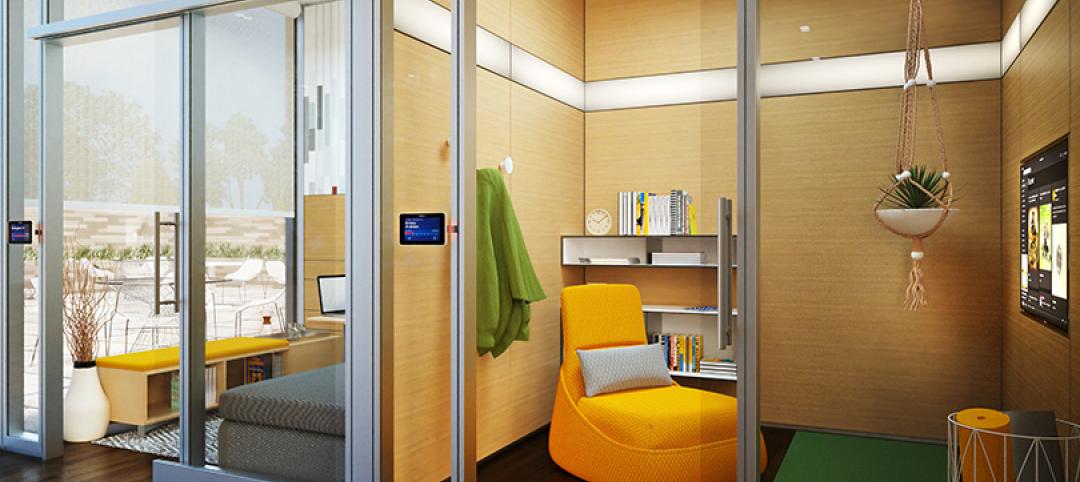The building design and construction industry must embrace change now. Stresses with finding talent, budgets, schedules, and the needs of clients call for change in approach. Companies are looking not only at how we work, but how we work with others.
My role as Chief Process Officer at HKS has allowed me to take a critical look at our operations within the firm, how we embrace our role in the design process, and how we set up our talent for success. This year, I combined that role with chairing the Board of the Lean Construction Institute, which allowed me to have conversations about the industry while tackling those same conversations within the firm.
The 2019 Lean Construction Institute Congress, held in Fort Worth, Texas, Oct. 14-18, was attended by more than 1,600 owners, architects, consultants, engineers, constructors, and trade contractors. LCI Congress featured more than 30 educational sessions and 75 presentations focused on Lean in the design and construction industry. I attended many of these sessions and offer the following takeaways, all of which focus on how we build stronger teams and contribute more value to our clients:
• More is not more: The opening keynote was not from a well-versed-in-Lean evangelist. Greg McKeown, author of Essentialism, The Disciplined Pursuit of Less, spoke about the power of less but better. He challenged us with these simple steps:
1. Explore. What is something essential for you right now that you are under-investing in?
2. Eliminate. What is something nonessential that you are over investing in?
3. Execute. How can you make it as easy as possible to transition the time you spend to the essential things?
Lean thinking encourages teams to add value (essential) by eliminating waste (non-essential) from all work efforts. McKeown’s insight can help us recognize and identify simply what is easy for us to do—take on more that is nonessential. As part of a team, agree together on what is essential and nonessential, get consensus, and build more value.
• Integrate evidence-based design through Lean thinking: Lean encourages value-based decision making with an all-team collaborative work environment. Evidence-based design reinforces the idea that we should be making decisions built on proven research. Using Lean methods for research, understanding customer needs, and applying the EBD research to solve problems is a pairing that maximizes the team’s efforts.
• This is a humble place—leave your egos at the door: The LCI Congress is a unique gathering of owners, designers, developers, project coaches, contractors, and trade contractors to discuss what worked and what didn’t with their projects. They share their mistakes—and how to fix them—even with competitors. The same for project teams. Multiple case studies presented their project stories, discussing their successes and failures. Teams represented different companies and disciplines of work but talked as one unit. The overall message: To effectively solve problems we must use our expertise, not our egos.
Also see: Movers + Shapers Report - Lean and Mean
• We are here to learn: Mike Staun, formerly with Proctor and Gamble, talked about the most pressing challenges in construction today and how Lean IPD can solve them. Stan Davis and Shernette Kydd with Cook Children’s Medical Center talked about strategic thinking with both healthcare project delivery and healthcare delivery. Merck’s journey, told by George Cusick, focused on growth demands based on customers’ needs and how working with Tier 1 construction partners helped meet those needs. No one claimed to have all the answers, but they all wanted to learn.
• Building relationships is the key: Our projects serve a greater purpose; they serve communities and the people in them. Engaging with the community for a purpose bigger than ourselves is an easy way to build strong relationships on teams. Teams that have strong relationships and Lean cultures of improvement can openly tackle problems and find innovative solutions. And they perform better.
• Mental health is a construction industry issue: Building design and construction can be a stressful profession. Statistics shared at the Congress showed that the construction suicide rate is four times the national average and is the leading cause of construction fatalities. The decline in talent entering related fields, the stress of budgets and schedules, and increased expectations add to those strains. We should watch out for our team members and the warning signs of depression, and encourage them to get help.
• Have fun: Whether it was in the Advanced Practitioners session, where industry leaders shared ideas, or in individual presentations, bringing back the fun was a common theme at LCI Congress. Developing a strong bond with your project team, regardless of your background, allows you to solve conflicts and still have fun.
Related Stories
| Dec 22, 2014
What Building Teams can learn from home builders' travails
Commercial and residential construction can be as different as night and day. But as one who covered the housing industry for nearly a decade, I firmly believe AEC firms can learn some valuable lessons from the trials and tribulations that home builders experienced during the Great Recession, writes BD+C's John Caulfield.
| Dec 22, 2014
Skanska to build Miami’s Patricia and Phillip Frost Museum of Science
Designed by Grimshaw Architects, the 250,000-sf museum will serve as an economic engine and cultural anchor for Miami’s fast-growing urban core.
| Dec 22, 2014
Studio Gang to design Chicago’s third-tallest skyscraper
The first U.S. real-estate investment by The Wanda Group, owned by China’s richest man, will be an 88-story, 1,148-ft-tall mixed-use tower designed by Jeanne Gang.
| Dec 19, 2014
Zaha Hadid unveils dune-shaped HQ for Emirati environmental management company
Zaha Hadid Architects released designs for the new headquarters of Emirati environmental management company Bee’ah, revealing a structure that references the shape and motion of a sand dune.
| Dec 19, 2014
Chicago Architecture Biennial to hold 'Lakefront Kiosk Competition'
The first Chicago Architecture Biennial will take place from October 2015-January 2016, with a theme of "The State of the Art of Architecture."
| Dec 18, 2014
Frank Lloyd Wright's Taliesin West to be recreated—with LEGO
Containing more than 180,000 LEGO bricks in 11 colors and 120 different shapes, the model measures eight by four feet and is made entirely of standard LEGO parts.
| Dec 18, 2014
11 new highs for tall buildings: CTBUH recaps the year's top moments in skyscraper construction
The Council on Tall Buildings and Urban Habitat cherrypicked the top moments from 2014, including a record concrete pour, a cautionary note about high-rise development, and two men's daring feat.
| Dec 18, 2014
International Parking Institute and Green Parking Council collaborate with GBCI
The new collaboration recognizes importance of sustainable parking facility design and management to the built environment.
| Dec 18, 2014
Top 10 sports facilities of 2014: Designboom ranks the year's best projects
The list includes some of the year's epic stadiums, such as World Cup Stadium Arena de Amazonia in Manaus, Brazil, and smaller projects, like the Spordtgebouw Sports Centerin the Netherlands.
| Dec 18, 2014
In response to ultra-open and uber-collaborative office environments
Susan Cain’s bestselling 2012 book, "Quiet: The Power of Introverts in a World That Can’t Stop Talking" has made an impact on how we understand our current workforce, recognizing that at least one-third of the people we work with are introverts, writes SRG Partnership's Susan Gust.
















